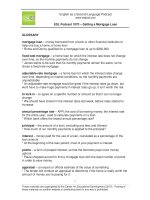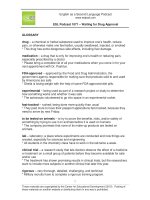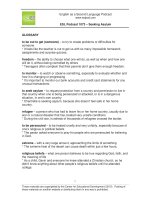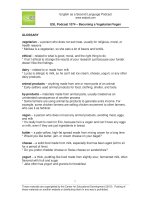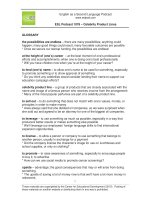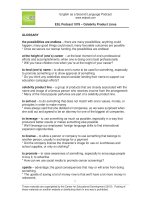ESL podcast 1081 – personal grooming
Bạn đang xem bản rút gọn của tài liệu. Xem và tải ngay bản đầy đủ của tài liệu tại đây (97.11 KB, 10 trang )
English as a Second Language Podcast
www.eslpod.com
ESL Podcast 1081 – Personal Grooming
GLOSSARY
to bathe – to wash one’s body; to use soap and water to clean one’s body
* When Narjes was a baby, her parents bathed her in the kitchen sink.
to exfoliate – to remove dead cells from the surface of the skin, usually by
rubbing it with a rough substance or by using a chemical
* Every morning, Nancy exfoliates her face with a cream that contains ground-up
walnut shells and apricot pits.
to depilate – to remove hair, usually from one’s body
* How often do you depilate your legs?
to shave – to use a razor blade to cut hairs very close to the skin, so that the
hairs cannot be seen or felt
* Even though Gerald shaves every morning, he still has dark hairs on his chin
and cheeks by the late afternoon.
to wax – to remove hairs by the root by covering the hairs and skin with a hot,
sticky substance, waiting for it to cool, and then tearing it so that it pulls the hairs
out
* Many women wax their eyebrows to have an arched shape.
armpit – underarm; the part of the body below the shoulder, between the side of
the torso and the upper arm, where hairs grow
* How old were you when you began using deodorant on your armpits?
bikini area – the parts of a woman’s upper legs that are seen when she is
wearing a bikini (two piece, small) swimsuit, immediately next to the fabric
* The skin in the bikini area is sensitive, so shaving there might result in irritation
and redness.
nail clippers – a small tool used to cut one’s fingernails and toenails
* Oh, my nail just broke. Do you have some nail clippers I can use to cut this
piece off?
nail file – small tool with a rough surface on one side, rubbed repeatedly against
the tip of a nail to change its shape and make it smooth
* Did the manicurist use the nail file before or after she soaked your nails in
soapy water?
1
These materials are copyrighted by the Center for Educational Development (2015). Posting of
these materials on another website or distributing them in any way is prohibited.
English as a Second Language Podcast
www.eslpod.com
ESL Podcast 1081 – Personal Grooming
tweezers – a small tool with two small ends joined at the opposite end, used to
pick up and/or pull very small objects, like hairs and splinters
* You should be able to get that splinter out with a good pair of tweezers.
nails – fingernails and toenails; the hard, flat surfaces at the end of each finger
and toe
* Betty painted her nails to match the color of her dress.
to pluck – to pull out one hair, usually by using tweezers
* Nikita has a few long hairs that grow on her chin, so she always plucks them.
eyebrows – the thin row of hair that grows above each eye, at the base of the
forehead
* Ingrid raised her eyebrows in surprise.
the ins and outs – detailed information about something; characteristics of
something
* Within a few weeks, you’ll be an expert on the ins and outs of our billing
procedures.
personal grooming – how one takes care of one’s personal cleanliness and
appearance, especially regarding hair care, skin care, and makeup
* How can we tell a co-worker that he needs to improve his personal grooming if
he wants to work directly with clients?
high-maintenance – requiring a lot of work to keep something at a good level of
performance or appearance, especially to maintain one’s physical appearance
* Jack knew that Brittany was high-maintenance when she took two and a half
hours to put on make-up and dress to go to dinner.
high-strung – very tense; nervous and worried; easily upset
* Randall is really high-strung before he has to make a presentation. It’s better
not to talk to him.
2
These materials are copyrighted by the Center for Educational Development (2015). Posting of
these materials on another website or distributing them in any way is prohibited.
English as a Second Language Podcast
www.eslpod.com
ESL Podcast 1081 – Personal Grooming
COMPREHENSION QUESTIONS
1.
a)
b)
c)
Shaving is an example of
Bathing
Exfoliating
Depilating
2.
a)
b)
c)
Which tool is used for plucking?
Nail clippers
A nail file
A pair of tweezers
.
______________
WHAT ELSE DOES IT MEAN?
to shave
The verb “to shave,” in this podcast, means to use a razor blade to cut hairs very
close to the skin, so that the hairs cannot be seen or felt: “Gretchen cut her ankle
while she was shaving her legs this morning.” The verb “to shave” also means to
use a sharp tool to remove the top layer of something: “The waiter shaved some
parmesan cheese onto our pasta.” Or, “How did the woodworker shave the curvy
legs of this table?” When taking about prices, “to shave” means to lower the price
of something: “Are the salespeople allowed to shave a few dollars off the price to
make a sale?” Finally, the phrase “a close shave” is a close call, or a situation
where someone barely escaped an accident or danger: “The road was icy and
the car almost hit a tree. That was a close shave!”
to pluck
In this podcast, the verb “to pluck” means to pull out one hair, usually by using
tweezers: “Is it more painful to pluck your eyebrows one hair at a time, or to use
wax to rip many hairs out at once?” The phrase “to pluck (someone) out of
(something)” means to rescue someone quickly from a dangerous situation: “The
teacher plucked the student from a group of bullies.” Or, “The rescue helicopter
plucked people from rooftops during the flooding.” Finally, the phrase “to pluck
(something) out of thin air” means to guess, or to pick a number or answer
without first thinking about it carefully: “Are those sales figures based in reality, or
did you just pluck those numbers out of thin air?”
3
These materials are copyrighted by the Center for Educational Development (2015). Posting of
these materials on another website or distributing them in any way is prohibited.
English as a Second Language Podcast
www.eslpod.com
ESL Podcast 1081 – Personal Grooming
CULTURE NOTE
New Beauty Treatments
“Beauty salons” (businesses that provide beauty services and treatments,
especially for women) are always “innovating” (coming up with new ideas,
products, and services), trying to find new ways to serve their customers. For
example, in recent years “eyebrow threading” has become a popular “alternative”
(another way of doing something) to eyebrow waxing. In eyebrow threading, a
long cotton string is “doubled” (folded in half) and “twisted” (with two pieces
wrapped around each other), and then rolled against unwanted hairs. This pulls
out a thin line of hairs all at the same time, “whereas” (while in contrast) eyebrow
waxing pulls out a large area of hairs, and plucking pulls out only one hair at a
time. Threading gives “beauticians” (people who provide beauty services) more
control in shaping their customers’ eyebrows.
“Blowout bars” are also becoming very popular. A “blowout bar” is a hair salon
that offers only one service: Hair professionals wash and “blow dry” (dry using a
hair dryer) a woman’s hair with “beauty products” (chemicals and other
substances) that make the hair straight or “wavy “(with very large, open curls),
“smooth” (without little pieces of hair going in many directions) and “voluminous”
(not flat).
Other beauty salons are innovating by bring their beauty services to the office. In
New York City, where there are many “affluent” (wealthy) professional women,
beauticians go into the workplace to offer “manicures” (fingernail treatments),
“pedicures” (toenail treatments), “blowouts” (hair styling using a hair dryer),
makeup applications, and even “spray tanning” (the process of spraying a
colored chemical onto skin to make it appear tanned from sun exposure).
______________
Comprehension Questions Correct Answers: 1 – c; 2 – c
4
These materials are copyrighted by the Center for Educational Development (2015). Posting of
these materials on another website or distributing them in any way is prohibited.
English as a Second Language Podcast
www.eslpod.com
ESL Podcast 1081 – Personal Grooming
COMPLETE TRANSCRIPT
Welcome to English as a Second Language Podcast number 1,081 – Personal
Grooming.
This is English as a Second Language Podcast episode 1,081. I’m your host, Dr.
Jeff McQuillan, coming to you from the Center for Educational Development in
beautiful Los Angeles, California.
Visit our website at ESLPod.com. Become a member of ESL Podcast. When you
do, you can download the eight- to ten-page Learning Guide we provide for each
and every episode of our current episodes. The Learning Guide contains a
complete transcript of everything I say, so if there’s something you don’t
understand, you can look at the Learning Guide. Isn’t that great?
This episode is a dialogue between Giorgio and Anna. Giorgio and Anna are
talking about personal grooming – things you do to keep yourself clean and
good-looking. Let’s get started.
[start of dialogue]
Giorgio: I’ll pick you up tonight at 7:00, okay?
Anna: You’d better make it 8:00. I need time to get ready.
Giorgio: You just need to go home, take a shower, and throw on some clothes.
How much time do you need?
Anna: You have no idea what a woman has to do to look her best, do you? Not
only do I have to bathe, I need to exfoliate and depilate.
Giorgio: “Depilate”?! What’s that?
Anna: That’s shaving and waxing to you. I have to shave and wax my legs, my
armpits, and bikini area.
Giorgio: Whoa! That’s way too much information. I didn’t need to know that.
Anna: After that, I’ll need my nail clippers, nail file, and tweezers to do my nails
and my plucking.
Giorgio: I don’t even want to know what you pluck.
5
These materials are copyrighted by the Center for Educational Development (2015). Posting of
these materials on another website or distributing them in any way is prohibited.
English as a Second Language Podcast
www.eslpod.com
ESL Podcast 1081 – Personal Grooming
Anna: Just my eyebrows and my . . .
Giorgio: Stop! I don’t need to know the ins and outs of your personal grooming. Is
all that really necessary?
Anna: You are going to introduce me to your brother, aren’t you? Your very
handsome brother?
Giorgio: I was until I heard all that. I don’t know if I want my brother dating a
woman who’s so high-maintenance.
Anna: High-maintenance? High-maintenance?! Who are you calling highmaintenance?
Giorgio: And high-strung!
[end of dialogue]
Giorgio begins our dialogue by asking Anna, “I’ll pick you up tonight at 7:00,
okay?” “To pick someone up” means usually to drive to their house and to take
them somewhere in a car. Anna says, “You’d better make it 8:00. I need time to
get ready.”
Giorgio says, “You just need to go home, take a shower, and throw on some
clothes.” Giorgio says that it shouldn’t take Anna long to get ready to go. She just
needs to “take a shower” – to wash herself – and to “throw on,” or put on, some
clothes. “Throw on” is a phrasal verb used informally the same way we would use
the phrasal verb “to put on” when we’re referring to clothes. Giorgio says, “How
much time do you need?”
Anna says, “You have no idea what a woman has to do to look her best, do
you?” I don’t, either. Anna says, “Not only do I have to bathe, I need to exfoliate
and depilate.” Anna is complaining that Giorgio, being a man, doesn’t understand
all the things that a woman has to do, and quite honestly, I as a man don’t
understand them either, but I’ll try to explain as best I can.
Anna starts by talking about bathing, and that’s the one thing I do understand.
“To bathe” (bathe) means to wash yourself, either in a shower or in the bathtub.
“Exfoliate” (exfoliate) means to remove the dead skin cells from the surface of
your skin, usually by rubbing your skin with either a rough, tough substance or
6
These materials are copyrighted by the Center for Educational Development (2015). Posting of
these materials on another website or distributing them in any way is prohibited.
English as a Second Language Podcast
www.eslpod.com
ESL Podcast 1081 – Personal Grooming
using some sort of chemical. This is something I’ve never done, and I don’t know
how it’s done, but I am told by women, including my wife, that it is in fact done.
Something else women apparently do is “depilate.” Now, I’m so unfamiliar with
this concept that I actually had to look up the pronunciation of that word.
Absolutely true. Anyway “depilate” (depilate) is when you remove hair from your
body. Now I understand why I didn’t know the meaning of it – and neither does
Giorgio, because he says, “‘Depilate’?! What’s that?” Exactly right, Giorgio.
Anna says, “That’s shaving and waxing to you.” “To shave” (shave) is something
I do understand, because men – many men – shave their faces. I shave my face
every couple of days when I’m not feeling too lazy. “Waxing” (waxing) is
removing hairs from your body by putting on a hot, sticky substance called “wax.”
Wax is what we usually make candles out of. It sounds very painful. I’m told it is
very painful, and it’s not something that most men would probably do, but
apparently some women do this.
She says, “I have to shave and wax my legs, my armpits, and bikini area.” Well, I
understand shaving and waxing your legs, but apparently Anna also has to do
that to her armpits. Your “armpits” (armpits) are the areas below your shoulder,
between where your arms come into your body and the main part of your body –
the torso or center part of your body.
Most people have hair under their arms in their armpits. I know I do. But Anna is
going to remove that hair, which is again something apparently women do. Anna
also needs to do something with the “bikini area.” A “bikini” (bikini) is a kind of
swimsuit that is in two pieces that a woman wears. One piece covers the top –
her breasts. The other piece covers the bottom. The things that you don’t want
other people to see, let’s say.
So Giorgio says, “Whoa! That’s way too much information.” “Too much
information” means you’re telling someone things that are too personal, that they
don’t need to know. We abbreviate this now in English “TMI.” If someone is
giving you information about their personal life that you don’t want to know or
don’t think you should know, you might say “TMI,” especially if it’s something that
is embarrassing to either you or to the person. Giorgio, in fact, says, “I didn’t
need to know that.” But Anna continues.
She says, “After that, I need my nail clippers, nail file, and tweezers to do my
nails and my plucking.” Your “nails” are the parts of your hand and foot that are
on the very ends of your fingers and your toes – the hard substances that grow
out of the ends of your fingers and toes. Those are your “nails” (nails). So, a “nail
7
These materials are copyrighted by the Center for Educational Development (2015). Posting of
these materials on another website or distributing them in any way is prohibited.
English as a Second Language Podcast
www.eslpod.com
ESL Podcast 1081 – Personal Grooming
clipper” would be something that cuts your nail. The verb “to clip” (clip) means to
cut. A “nail file” (file) is a small tool, usually a flat little stick that is rubbed against
the nails in order to make them smooth after you cut them, I guess.
“Tweezers” (tweezers) are small instruments that look like little pliers – like
scissors, sort of, but they don’t cut things. They are used to grab onto something
that’s very small and remove it. If, for example, you pick up a piece of wood and
the wood is rough, you might get a little piece of the wood in the skin of your
finger. To remove that little piece of wood – what we would call a “sliver” (sliver) –
you would use a very small tool called the “tweezers.” Well, that’s what Anna is
using.
Now, why is she using the tweezers? Well, apparently in order to do her
“plucking” (plucking). “Plucking” comes from the verb “to pluck” (pluck), which
means to pull out hair from your body, usually using a tweezers. Once again, it
sounds rather painful. Giorgio, upon hearing this, says what I think most men
would say: “I don’t even want to know what you pluck” (what kind of hairs you’re
pulling out).
But Anna tells him – “Just my eyebrows and my . . .” “Eyebrows” (eyebrows) are
the thin rows of hair that grow above your eyes. Women sometimes pluck the
hairs out of their eyebrows, I’m told, in order to make them look better. This is not
something that most men do. I certainly would not do that. I cut my eyebrows
sometimes, but I don’t pluck them. Once again, I’m not used to that kind of pain
the way women are, I guess.
Giorgio doesn’t want to know what other hairs Anna plucks. He tells her “Stop! I
don’t need to know the ins and outs of your personal grooming.” The expression
“the ins (ins) and outs (outs)” refers to the detailed information about something,
the specific information about something. In this case, it’s the ins and outs of
personal grooming. “Grooming” (grooming) comes from the verb “to groom,”
which means to take care of something in terms of the physical cleanliness and
appearance of it.
So, “personal grooming” would be taking care of yourself – washing yourself,
cutting your hair, shaving, and so forth. All the crazy things that women do. Anna
says, “You are going to introduce me to your brother, aren’t you? Your very
handsome brother?” Anna is explaining why she needs to do all of this personal
grooming. It is apparently because Giorgio is going to introduce her to Giorgio’s
brother. “To introduce someone” to someone else means to take someone and
have them meet someone that you know.
8
These materials are copyrighted by the Center for Educational Development (2015). Posting of
these materials on another website or distributing them in any way is prohibited.
English as a Second Language Podcast
www.eslpod.com
ESL Podcast 1081 – Personal Grooming
So, if you have a new girlfriend and you decide to introduce your girlfriend to your
parents, you take your girlfriend home with you and you let your parents meet
your girlfriend. That’s usually considered somewhat of a serious step in a
relationship, when you meet the parents – when you meet the parents of your
boyfriend or your girlfriend. Well, Giorgio has a brother who Anna thinks is very
handsome, very good-looking. Giorgio says, “I was,” meaning I was going to
introduce you to my brother, “until I heard all that,” meaning until I heard about all
the things that you do in doing your personal grooming.
Giorgio says, “I don’t know if I want my brother dating” – going out romantically
with – “a woman who is so high-maintenance.” The expression “highmaintenance” (maintenance) is used to describe something that requires a lot of
work. It’s often used in a negative way to describe a woman who is very
demanding, who requires a lot of attention. I’m not sure if that’s what Giorgio is
referring to here. He does think that Anna takes an awful long time in order to get
ready, and perhaps that’s why he thinks she’s high-maintenance.
Anna considers this an insult, a negative thing to say about her. She says, “Highmaintenance? High-maintenance? Who are you calling high-maintenance?”
She’s very upset. Giorgio, however, doesn’t apologize. Instead, he says,
insultingly, “And high-strung!” Someone who’s “high-strung” (strung) is someone
who is easily upset, someone who gets mad at the smallest little thing, or
someone who’s just very nervous and very tense (tense) – someone who’s
always very worried, perhaps.
Now let’s listen to the dialogue, this time at a normal speed.
[start of dialogue]
Giorgio: I’ll pick you up tonight at 7:00, okay?
Anna: You’d better make it 8:00. I need time to get ready.
Giorgio: You just need to go home, take a shower, and throw on some clothes.
How much time do you need?
Anna: You have no idea what a woman has to do to look her best, do you? Not
only do I have to bathe, I need to exfoliate and depilate.
Giorgio: “Depilate”?! What’s that?
9
These materials are copyrighted by the Center for Educational Development (2015). Posting of
these materials on another website or distributing them in any way is prohibited.
English as a Second Language Podcast
www.eslpod.com
ESL Podcast 1081 – Personal Grooming
Anna: That’s shaving and waxing to you. I have to shave and wax my legs, my
armpits, and bikini area.
Giorgio: Whoa! That’s way too much information. I didn’t need to know that.
Anna: After that, I’ll need my nail clippers, nail file, and tweezers to do my nails
and my plucking.
Giorgio: I don’t even want to know what you pluck.
Anna: Just my eyebrows and my . . .
Giorgio: Stop! I don’t need to know the ins and outs of your personal grooming. Is
all that really necessary?
Anna: You are going to introduce me to your brother, aren’t you? Your very
handsome brother?
Giorgio: I was until I heard all that. I don’t know if I want my brother dating a
woman who’s so high-maintenance.
Anna: High-maintenance? High-maintenance?! Who are you calling highmaintenance?
Giorgio: And high-strung!
[end of dialogue]
Our scriptwriter understands all the ins and outs of the English language. I speak,
of course, of the wonderful, not high-maintenance Dr. Lucy Tse.
From Los Angeles, California, I’m Jeff McQuillan. Thank you for listening. Come
back and listen to us again right here on ESL Podcast.
English as a Second Language Podcast was written and produced by Dr. Lucy
Tse, hosted by Dr. Jeff McQuillan. Copyright 2015 by the Center for Educational
Development.
10
These materials are copyrighted by the Center for Educational Development (2015). Posting of
these materials on another website or distributing them in any way is prohibited.
